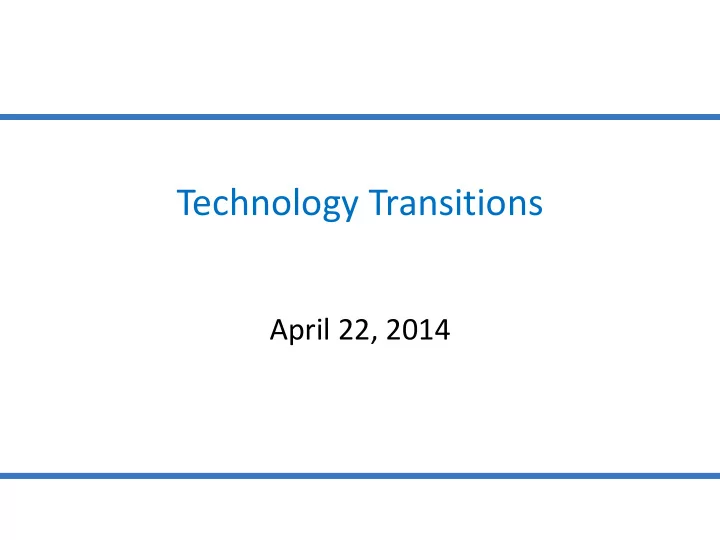

Technology Transitions April 22, 2014
Changing Communications Landscape • December 2009 vs. December 2012 * Retail sw itched access lines : decrease from 127 million to 96 million Compound annual decline of 9% I nterconnected VoI P subscriptions : increase from 26 million to 96 million Compound annual growth of 17% Mobile subscriptions : increase from 274 million to 305 million Compound annual growth of 4% • Nearly 40% of U.S. households are now wireless-only (over 60% for adults age 25-29) * * • 67% of mobile subscribers now have smartphones (up from 16% in 2009) * * * • Widespread rollout of 4G LTE networks Sources: * Nov. 2013 FCC Local Telephone Competition Report * * June 2013 CDC National Health Interview Survey on Wireless Substitution * * * comScore M obiLens and Mobile Metrix, March 2014, reporting key trends in the U.S. smartphone industry for January 2014 2 2
Multiple Forms of Technology Transitions 3
Potential Benefits of Tech Transitions • Innovative product offerings and services • Infrastructure investments • Increased network efficiencies • New means of communications • Disabilities access • Consumer welfare 4
The Challenge • Technology transitions are ongoing and diverse • These transitions have occurred organically in parallel with availability of legacy services • As transitions progress: • At a certain point, a service changes so much that it may be a new service (a “Ship of Theseus”) • Providers also will seek to discontinue the legacy services when they reach a ‘tipping point’ • Essential to preserve fundamental values in this process (the “Network Compact”) 5
Network Compact Universal Access Public Safety Statutory Values Competition Consumer Protection 6
Jan. 30, 2014 FCC Technology Transitions Order Focused on conducting experiments and data to understand how consumers are affected by historic technology transitions. 1. Service-based experiments 2. Rural broadband experiments 3. R&D for persons with disabilities 4. Numbering Testbed 5. Ongoing Data Initiative 6. Public Safety IP Transition Workshop Chairman Wheeler also announced plans for a policy-focused Managerial Framework 7
Service-based Experiments Order invites providers to propose “service-based experiments” on a rolling basis during a 12-month period • “[E]xperiments in which providers seek to substitute new communications technology for the TDM-based services over copper lines that they currently are providing to customers, with an eye toward discontinuing those legacy services . . .” • These are “impact” experiments that test effects of transitions on consumers and enduring network values. o Not intended to resolve legal or policy debates o Not intended to test technology per se 8
AT&T Proposal: Carbon Hill, AL & Kings Point, FL 9
AT&T Proposal: Transitions • Voice (VoIP) UVerse • High-Speed Internet • Voice Wireless Home • 4G LTE POTS Phone Broadband • 4% in Carbon Other Hill TBD 10
AT&T Proposal: Phases • Started on Feb. 27, 2014 • Initial outreach, planning 0 • Grandfathering of existing retail accounts • Preceded by Section 214(a) applications and public process 1 • Sunsetting of existing retail accounts • Preceded by Section 214(a) applications and public process 2 AT&T also plans “additional phase” involving wholesale products. This too would require further filings and public processes. 11
Rural Broadband Experiments Intended to gather information about – 1. Interest in extending fiber (where and for how much support) 2. Characteristics of areas where providers would prefer to deploy wireless, and what types of wireless offerings that residential consumers would find acceptable 3. Impact on community anchor institutions 4. How to work cooperatively with States, localities, and Tribal governments 12
Rural Broadband Experiments • Over 1,000 expressions of interest filed – a geographically diverse group that includes ILECs, CLECs, electric co-ops, WISPs, governmental entities, and cable operators • After reviewing record, FCC will adopt budget and criteria for selecting experiments • After second FCC order, will solicit formal project proposals • FCC expects to select small number of projects later in 2014 • Rural Broadband Experiments webpage: http://www.fcc.gov/encyclopedia/rural-broadband- experiments 13
Questions? 14 14
Recommend
More recommend